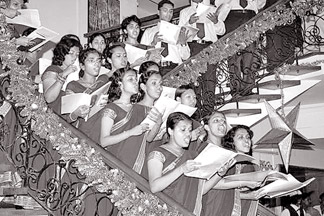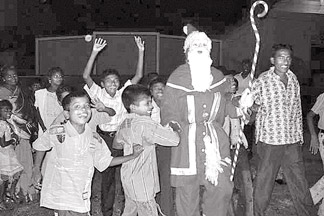Notes for a different kind of Christmas Carol
 Christmas came to me as cards, the colours green and red, and
pictures of snow. This was when I was a child. I didn’t know back then
that Jesus Christ was not a blond-haired, blue-eyed, white man who was
born in a snow-covered day in December. It took me a while to understand
that history can be read as a process of appropriations, re-crafting and
the re-crafted being marketed as truth. Christmas came to me as cards, the colours green and red, and
pictures of snow. This was when I was a child. I didn’t know back then
that Jesus Christ was not a blond-haired, blue-eyed, white man who was
born in a snow-covered day in December. It took me a while to understand
that history can be read as a process of appropriations, re-crafting and
the re-crafted being marketed as truth.
I am a Buddhist so I could be forgiven for growing up thinking that
Christmas was a festival; made up, as I said, of greeting cards,
Christmas trees, carols and such. It didn’t take long, however, for me
to understand that there was a lot more to Christmas than the glitter.
After factoring out frill, myth and appropriation, there’s still so much
of value in the story of Jesus Christ and not just for those who see him
as ‘Son of God’, ‘Saviour’ etc. At least, that’s my impression, from my
reading of the Bible and understanding of relevant ecclesiastical
matters. This is perhaps why Christmas appears to me as a monumental
fiction.
|

singing Christmas carols |

christmas in Sri Lanka |
No, I am not opposed to the celebration, the cheer and festive
spirit, not at Christmas nor on any other day. That’s a right and it is
healthy too. Down-in-the-mouth is not exactly my cup of tea. I worry,
though, whether this is all it is for the vast majority of Christians. I
have no way of knowing of course about what Christians do in the
in-betweens, befores and afters of ‘Christmassing’. I see a lot of crass
commercialization, spectacle and bucks exchanging hands. Maybe what is
not seen outweighs several time what is seen. Maybe not.
I can only speak of how I, a Buddhist, understand Christmas or rather
what I do on Christmas. This morning I got a Christmas greeting, from a
Buddhist. The email message was as follows: ‘This is to wish you and all
members of your family a merry Christmas and a very happy and bright New
Year. Although I am a Buddhist (or because I am a Buddhist!) I have
great respect for Jesus Christ and his message of love.
It is rather a pity that Christians pay more attention to the
Reveillon (Christmas supper) than to the spiritual aspect of the
occasion.’
As I said, I don’t know what the average Christian does before and
after Christmas supper. I had never heard the word ‘Reveillon’ before
either. As I always do when encountering the unfamiliar, I ‘looked up’.
‘Reveillon’ means ‘awakening’ in French and refers to an elaborate meal
taken after attending midnight mass on Christmas Eve. Apparently, in the
past, it marked the end of the four-week ‘Advent’ fast. I never thought,
until today, that ‘fast’ was even remotely associated with ‘Christmas’.
‘Fast’ is made of a certain kind of denial and is usually associated
with a determination to devote time to reflection on the fundamental
tenets of one’s religious convictions. It is a time to reflect on
frailties, on error to self, other and (if one so believes) to god. It
is a determination to devote time to meditate on the eternal verities,
obtain a sense of proportion on worldly and spiritual things. It is a
time to be penitent; not just ask for forgiveness (from those who are
believed to possess the authority to judge and confer forgiveness) but
to grieve, to sigh (if one went to the relevant Hebrew word) and commit
oneself to changing ways, call it ‘to see God’ if you will.
One does not have to be a theist to do all these things, or at least
to obtain from Christmas that something that makes one a better Buddhist
or Muslim, for example. We all have things to grieve over. We all have
done and said things we ought to feel ashamed about. We all have reasons
to reflect. We can all be better than who we are right now. Jesus
Christ’s life was one of generosity. It was one of humility. He sighed.
This Christmas I will reflect on Jesus Christ, the beautiful man that
He was and the remarkable life He led. I believe feasting would
interrupt or disturb my meditation. I shall fast.
[email protected]
|



